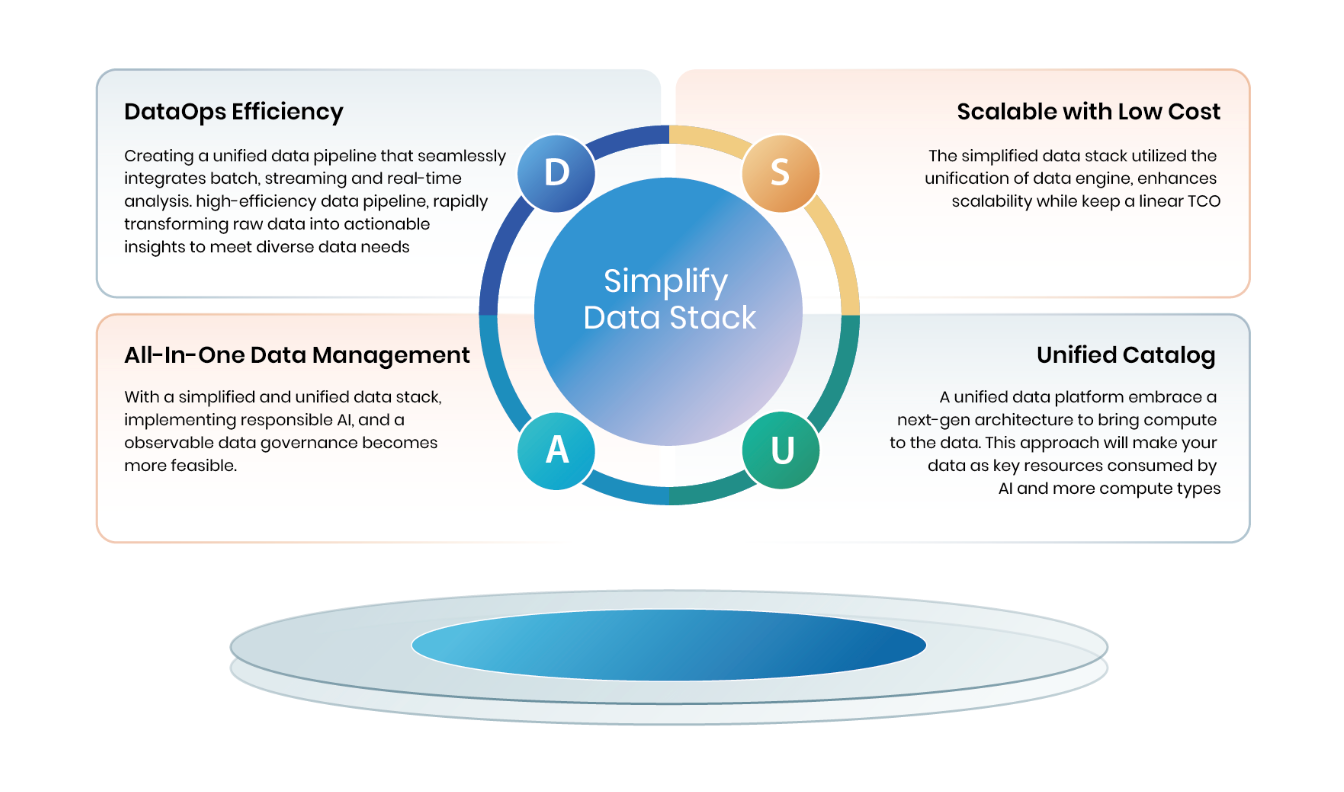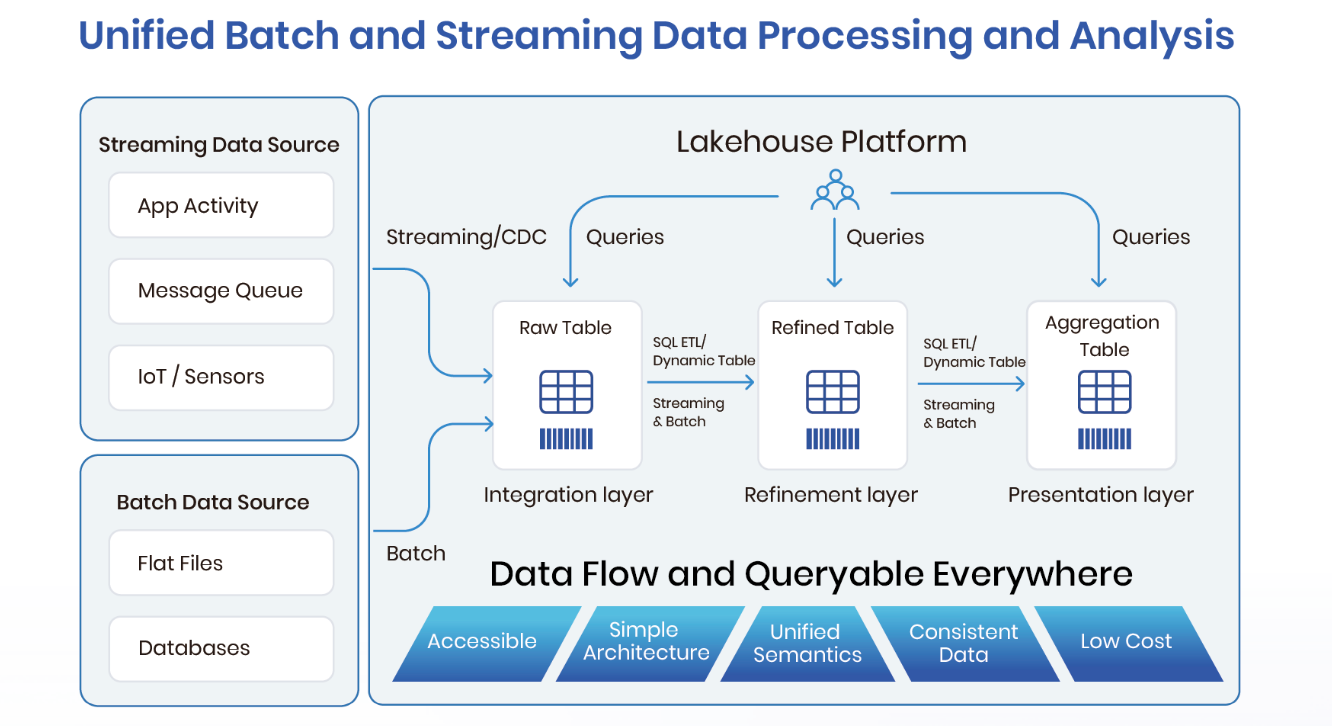Why Simplify Data Stack
Enterprises face significant challenges with the Modern Data Stack. Complex systems create inefficiencies, hindering data flow and insights. Managing multiple engines and redundant pipelines becomes overwhelming. Simplifying these processes is crucial. A streamlined approach enhances productivity and reduces operational burdens. The need to Simplify Data Stack becomes evident as organizations strive for efficiency and cost-effectiveness.
Simplify Data Stack for Scalability and Cost-Effectiveness

Unifying the Data Engine
Seamless integration transforms data management. Seamless integration transforms data management. Unified systems eliminate fragmented processes. Organizations achieve efficient data flow. Integrated platforms support diverse data types. Businesses experience improved operational efficiency. Data teams focus on innovation rather than maintenance.

Resource optimization enhances scalability. Streamlined systems reduce resource waste. Enterprises allocate resources effectively. Optimized data engines support growing demands. Organizations scale operations without increased costs. Efficient resource use drives business growth.
Managing Costs
Reducing redundancies lowers expenses. Simplified data stacks eliminate duplicate processes. Organizations save on infrastructure costs. Streamlined operations reduce maintenance needs. Businesses benefit from consolidated data management. Cost savings enhance profitability.
Predictable pricing models offer financial clarity. Bundled pricing simplifies budgeting. Organizations avoid unexpected expenses. Transparent costs support strategic planning. Predictable expenses facilitate long-term investments. Financial stability empowers business decisions.
Benefits of All-in-One Data Management
Responsible AI Implementation
Ethical Data Use
Responsible AI implementation requires ethical data use. Organizations must prioritize data integrity and transparency. Ethical practices ensure trustworthiness in AI systems. Data contracts play a crucial role in maintaining ethical standards. These contracts define clear guidelines for data usage and sharing. Establishing these standards prevents misuse and promotes accountability.
Bias Mitigation
Bias mitigation enhances AI reliability. Organizations need to identify and eliminate biases in data sets. This process involves continuous monitoring and evaluation. Engineering teams must extend their insights downstream. Accountability for data quality becomes essential. By addressing biases, AI systems deliver fair and accurate results.
Data Governance
Compliance Assurance
Data governance ensures compliance with industry regulations. Establishing data standards is vital for regulatory adherence. Organizations enforce data policies to maintain compliance. Monitoring data quality supports consistent regulatory alignment. Effective governance reduces risks associated with non-compliance. Compliance assurance builds organizational credibility and trust.
Security Enhancements
Security enhancements protect sensitive information. Unified data management strengthens security protocols. Centralized systems offer robust protection against breaches. Organizations implement strict access controls and encryption. Enhanced security measures safeguard data integrity. Reliable security fosters confidence in data-driven operations.
Unify Catalog for Data+AI Accessibility
Enhancing Data Accessibility
Centralized Data Access
Centralized data access transforms how organizations interact with information. A unified catalog consolidates data from various sources into a single repository. This approach eliminates the need to navigate multiple systems. Users gain immediate access to relevant data, enhancing efficiency. Centralized data repositories support seamless integration with business applications. Tools like Data Engineering Tools and Data Catalogs enable this transformation. These tools revolutionize sectors by enhancing decision-making and operational efficiency.
User-Friendly Interfaces
User-friendly interfaces simplify data interaction. Intuitive designs allow users to navigate complex datasets effortlessly. Organizations benefit from increased productivity as users spend less time searching for data. Interfaces that incorporate natural language processing (NLP) enhance user experience. NLP enables users to query data using everyday language. This capability democratizes data access, making it available to non-technical users. User-friendly interfaces foster a data-driven culture within organizations.
Supporting AI and Compute Types
Versatile Data Utilization
Versatile data utilization supports diverse AI and compute types. Unified catalogs provide a foundation for advanced analytics. Organizations leverage tools like Data Integration Tools to automate data extraction and transformation. These tools ensure that data is ready for AI applications. Versatile data utilization enables businesses to apply machine learning models effectively. Organizations gain insights from structured and unstructured data sources. This capability enhances strategic decision-making and innovation.
Accelerated AI Insights
Accelerated AI insights drive competitive advantage. Unified catalogs streamline the process of feeding data into AI systems. Organizations experience faster model training and deployment. Tools with cloud deployment and scalability address specific data-related challenges. Businesses achieve rapid insights by utilizing scalable cloud data warehouses. Accelerated AI insights empower organizations to respond swiftly to market changes. This agility positions businesses for success in a dynamic environment.
Introducing Singdata's Lakehouse
Comprehensive Solution
Features and Capabilities
Singdata's Lakehouse offers a robust solution for data management. The platform provides a transparent depiction of data origins and movements. This enhances clarity regarding the trajectory of data. A centralized repository encompasses all organizational data products. This includes metadata, documentation, and data lineage details. Users can explore, comprehend, and utilize data efficiently.
The Lakehouse integrates data ingestion, transformation, visualization, and governance. This cohesive approach eliminates complex integration efforts. Compatibility issues become a thing of the past. The integrated nature simplifies the overall data management process. Organizations experience streamlined operations and improved productivity.
Integration with Existing Systems
Seamless integration defines Singdata's Lakehouse. The platform works cohesively with existing systems. Data teams face fewer challenges when incorporating new tools. The risk of compatibility issues reduces significantly. This integration supports diverse data types and processes.
Organizations benefit from enhanced operational efficiency. The Lakehouse supports growing demands without increased costs. Enterprises allocate resources effectively, driving business growth. Singdata's solution empowers businesses to innovate and scale confidently.
Simplifying the data stack offers significant benefits. Organizations achieve enhanced efficiency and cost savings. A streamlined stack prepares your business for AI-driven insights. Singdata's Lakehouse provides a comprehensive solution. The platform integrates seamlessly with existing systems. Consider adopting Singdata's Lakehouse to drive innovation and scalability. Empower your enterprise with a unified approach to data management.
See Also
Factors Influencing Cost Savings in Contemporary Data Systems
Understanding Data and AI Platforms
